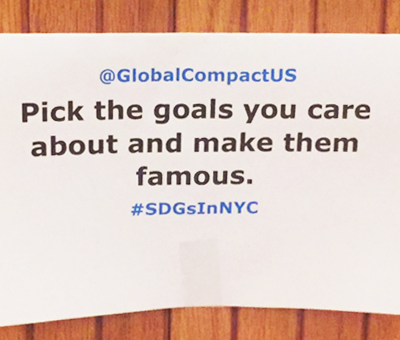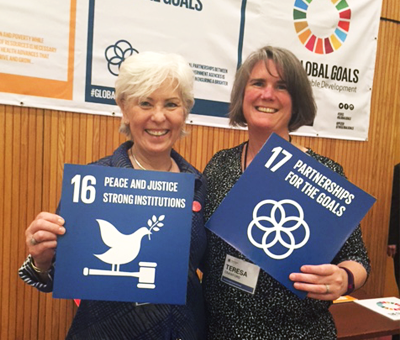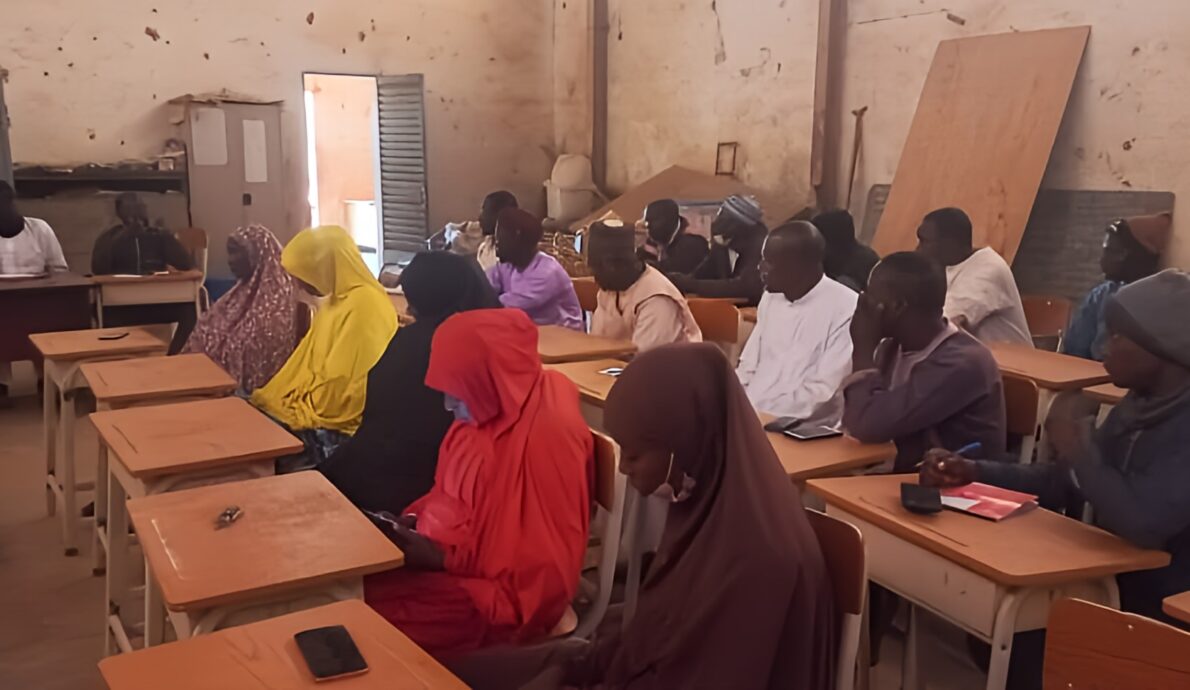They number 17, with 169 objectives and 193 countries committed. The rallying cry is “Leave No One Behind.” The Sustainable Development Goals, or what many call the Global Goals, will be the “kind of transformation desperately needed for the vitality of the planet and for everyone to have a fair chance at life,” according to President Lykketoff, of the UN General Assembly.
Here at Counterpart, our programs in more than 20 countries cover 15 out of the 17 SDGs, and most of our programs are contributing to success in more than one goal. We understand the urgency and the need for a global commitment to the SDGs.

UN Global Compact encouraged participants to share their favorite SDGs

Jennifer Jones, VP of Strategic Communications, and Teresa Crawford, Executive Director of the Social Sector Accelerator, show their pick of the SDGs to make famous.
On April 21, a day ahead of the historic signing of the Paris Agreement, I was at the UN for the “High Thematic Debate on the SDGs,” although there wasn’t any debate. President after president, Prime Ministers, and other cabinet ministers from countries all over the world spoke forcefully and passionately about the Global Goals and their country’s commitment to integrate them into their national development strategies.
The focus now is on SDG implementation and there wasn’t much debate about that either. Leaders consistently asked for assistance with financing, technology and capacity building.
The President of Zimbabwe emphasized the desire of many to act with conviction and speed. “Ambition must be matched with cohesion and speed. We need to inspire each other for the transformational journey ahead.” The need for partnerships – especially with the private sector was emphasized by many, along with the continued need to involve civil society. As the Nobel Laureate Leymah Gbowee reminded us, “there must be dialogue between people and governments for solutions for everyone. We must travel together.” The President of Peru called for the “active participation of civil society and the private sector, also adding that “good governance must reign.”
“Civil society and the private sector must be activated, governments on their own will not be enough,” emphasized the Administrator of the United National Development Programme.
Lisa Kingo, the Executive Director of the UN Global Compact couldn’t agree more. At a private sector meeting on the SDGs, held at Pfizer’s headquarters in New York a few weeks ago, Lisa declared, “Our job is to translate the SDGs into responsible business action and innovation.” Miguel Veiga-Pestana, Chief Communications Officer of the Gates Foundation told the crowd of nearly 200 corporate representatives, that “partnerships are key – government, civil society organizations, the private and philanthropic sectors.” He went on to suggest that we must use the SDGs as a yardstick for business success and that we must make SDGs the currency in our Board rooms, versus just an extension of corporate social responsibility programs. Peter A. Seligmann, Chairman and CEO of Conservation International told the group that “any company not engaged will be at a significant competitive disadvantage.” He added, “We need to realize we are all in this together.”
I wish Victoria Barrett, a 17-year old activist could have heard these leaders. Victoria spoke at the UN meeting on April 21. She told us she wished she didn’t have to fight so hard to protect her own future. Despite admitting her despair, Victoria also reminded us that “the SDGs give us the chance to change the course of history. They are a vision of humanity I know we can become.”
Perhaps Victoria had heard the words of an inspiring like-minded ally, Christiana Figueres, Executive Secretary of the UN Framework Convention on Climate Change. Christina demonstrated the kind of vision in moving forward the historic climate agreement that we now need for the Global Goals. In her words, “There is no victory without optimism.”




